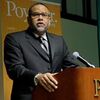Today is midterm election day. The 2018 elections could see the highest turnout for a midterm since the mid-1960s, another time of cultural and social upheaval. "It's probably going to be a turnout rate that most people have never experienced in their lives for a midterm election," says Michael McDonald, a professor at the University of Florida who studies turnout and maintains a turnout database. He is predicting that 45 to 50 percent of eligible voters will cast a ballot. That would be a level not seen since 1970, when 47 percent of voters turned out, or 1966, when a record 49 percent turned out for midterms.
What's driving so many voters to the polls, and will the results be as historic and impactful as the turnout?
In his recent piece "What does it mean to be progressive in America?," Michael Blosser says, "These US midterm elections will be influenced by radical social movements, will be the first time that open socialists win numerous local, state and national elections, could provide a check on Trump and open up possible new ways forward for the US left." Is this true? Are the so-called "progressives" such as Andrew Gillum in Florida, Stacey Abrams in Georgia and Alexandria Ocasio-Cortez in New York really that radical?
Leftists and progressives in the United States have historically and with reason minimized the importance of electoral politics in moving forward revolutionary progress and reforms. Although the true power of progress is in the street and in the mobilization of the masses and working class, there is something to be said of having a backstop against some of the most reactionary laws and policies passed by the Trump administration. What can we say about this movement?
Race or class: which will motivate voters in these midterm elections? Two years ago, in 2016, angry, white, working-class voters in the key swing states of Pennsylvania, Michigan and Wisconsin pulled the lever for Trump as a way of expressing their anger over economic injustice — and a populist blue-collar wave swept the billionaire property mogul into office. But a range of studies published since then from political scientists, economists and pollsters have found that it was racial resentment and cultural anxiety — not economic anxiety — on the part of white voters that got Donald Trump into the Oval Office. What's the take on today's political landscape?
Is 'Trumpism' here to stay? Even though Americans usually don't consider foreign policy as being significant during midterms, most of the world is paying attention. If the Republicans do well, then many will conclude that 'Trumpism' is here to stay. The rest of the world would have to make a long-term adjustment to an America that is highly protectionist and suspicious of treaties on principle — whether they deal with climate change, arms control, refugees or migration. However, if the Democrats prosper tonight, then the US president's foreign critics will cling to the hope that the Trump years may yet turn out to be an aberration — and that the old America is waiting in the wings to return. Your thoughts on the foreign policy implications or potential implications of these mid-terms?
Countries that have been targeted by sanctions or tariffs by the Trump administration — such as Iran and China- will be keen to see the president receive a bloody nose at the ballot box. It is unlikely that significant Democratic Party gains would be enough to resurrect the Iran nuclear deal or to roll back tariffs on China — not least because many Democrats also lean towards protectionism and are hawkish on Iran. But a big political setback for the president would weaken the sense of momentum behind the Trump agenda.
GUESTS:
Tom Porter — African American Studies Department at Ohio University and former director of the King Center in Atlanta.
Eugene Craig III — Republican strategist, former vice-chair of the Maryland Republican Party and grassroots activist.
Dr. Adolphus Belk — Professor of American Government, Race and Ethnic Politics in the US, the Politics of Mass Incarceration and Public Policy at Winthrop University.
Dr. Riley Emmitt — Political scientist and assistant professor of Africana Studies at DePauw University.
We'd love to get your feedback at radio@sputniknews.com



